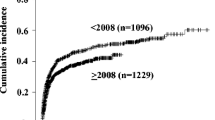Abstract
Few studies have addressed the role of reduced-intensity conditioning (RIC) and non-myeloablative (NMA) regimens in older adults with Philadelphia acute lymphoblastic leukemia (Ph + ALL). The objective of this current study was to compare the outcomes of RIC/NMA versus TBI-based myeloablative (MAC) regimens in Ph + ALL patients older than 40 years old who underwent hematopoietic cell transplantation (HCT) in CR1. We used a freely available database from the CIBMTR. Transplants were performed between 2013 and 2017. With a median follow-up of 37.6 months, we have included 629 patients. We used propensity score weighting. Three-year OSs were 64% in the TBI-MAC group and 66% in the RIC/NMA group. OS was not different (HR = 0.92; p = 0.69). Three-year relapse incidences were 21.6% and 27.6% in the TBI-MAC and RIC/NMA groups. RIC/NMA was not associated with an increase in relapse rate (HR 1.02; p = 0.91). Three-year NRMs were 24.3% in the TBI-MAC group and 20.3% in the RIC/NMA group. RIC/NMA was not associated with superior NRM (HR 0.88; p = 0.57). In summary, we have shown that RIC/NMA regimens achieve outcomes comparable to TBI-based MAC in Ph+ ALL older patients in CR1 who may tolerate a TBI-based MAC regimen.

Similar content being viewed by others
Data availability
The database is already available in the CIBMTR website.
References
Lee HJ, Thompson JE, Wang ES, Wetzler M (2011) Philadelphia chromosome-positive acute lymphoblastic leukemia: current treatment and future perspectives. Cancer 117:1583–1594
DeFilipp Z et al (2019) Hematopoietic cell transplantation in the treatment of adult acute lymphoblastic leukemia: updated 2019 Evidence-Based Review from the American Society for Transplantation and Cellular Therapy. Biol Blood Marrow Transplant 25:2113–2123
Ravandi F, Kebriaei P (2009) Philadelphia chromosome-positive acute lymphoblastic leukemia. Hematol Oncol Clin North Am 23:1043–1063
Akahoshi Y et al (2020) Reduced-intensity conditioning is a reasonable alternative for Philadelphia chromosome-positive acute lymphoblastic leukemia among elderly patients who have achieved negative minimal residual disease: a report from the Adult Acute Lymphoblastic Leukemia Working Group of the JSHCT. Bone Marrow Transplant 55:1317–1325
Yoon J et al (2019) Minimal residual disease–based long-term efficacy of reduced-intensity conditioning versus myeloablative conditioning for adult Philadelphia-positive acute lymphoblastic leukemia. Cancer 125:873–883
Wieduwilt MJ et al (2022) Haploidentical vs sibling, unrelated, or cord blood hematopoietic cell transplantation for acute lymphoblastic leukemia. Blood Adv 6:339–357
Ali MS et al (2019) Propensity score methods in health technology assessment: principles, extended applications, and recent advances. Front Pharmacol 10:973
Bachanova V et al (2014) Ph+ ALL patients in first complete remission have similar survival after reduced intensity and myeloablative allogeneic transplantation: impact of tyrosine kinase inhibitor and minimal residual disease. Leukemia 28:658–665
Giebel S et al (2016) Use of tyrosine kinase inhibitors to prevent relapse after allogeneic hematopoietic stem cell transplantation for patients with Philadelphia chromosome-positive acute lymphoblastic leukemia: a position statement of the Acute Leukemia Working Party of the: TKIs After AlloHSCT in Ph+ ALL. Cancer 122:2941–2951
Bazarbachi A et al (2022) 20-year steady increase in survival of adult patients with relapsed philadelphia-positive acute lymphoblastic leukemia post allogeneic hematopoietic cell transplantation. Clin Cancer Res 28:1004–1012
Nishiwaki S et al (2021) Measurable residual disease affects allogeneic hematopoietic cell transplantation in Ph+ ALL during both CR1 and CR2. Blood Adv 5:584–592
Acknowledgements
We used the freely available CIBMTR database.
Author information
Authors and Affiliations
Contributions
IOFJ and LJA designed the study and wrote the manuscript. LJA did all analyses.
Corresponding author
Ethics declarations
Competing interests
The authors declare no competing interests.
Additional information
Publisher's Note
Springer Nature remains neutral with regard to jurisdictional claims in published maps and institutional affiliations.
The authors state that the material is original, has not been published before nor is under consideration for publication in any other journal.
Rights and permissions
Springer Nature or its licensor (e.g. a society or other partner) holds exclusive rights to this article under a publishing agreement with the author(s) or other rightsholder(s); author self-archiving of the accepted manuscript version of this article is solely governed by the terms of such publishing agreement and applicable law.
About this article
Cite this article
de Oliveira Fernandes Junior, I., Arcuri, L.J. Myeloablative or reduced-intensity/non-myeloablative hematopoietic cell transplantation for Philadelphia-positive acute lymphoblastic leukemia in adults older than 40 years old — a secondary analysis of a CIBMTR database. Ann Hematol 103, 603–607 (2024). https://doi.org/10.1007/s00277-023-05532-8
Received:
Accepted:
Published:
Issue Date:
DOI: https://doi.org/10.1007/s00277-023-05532-8




